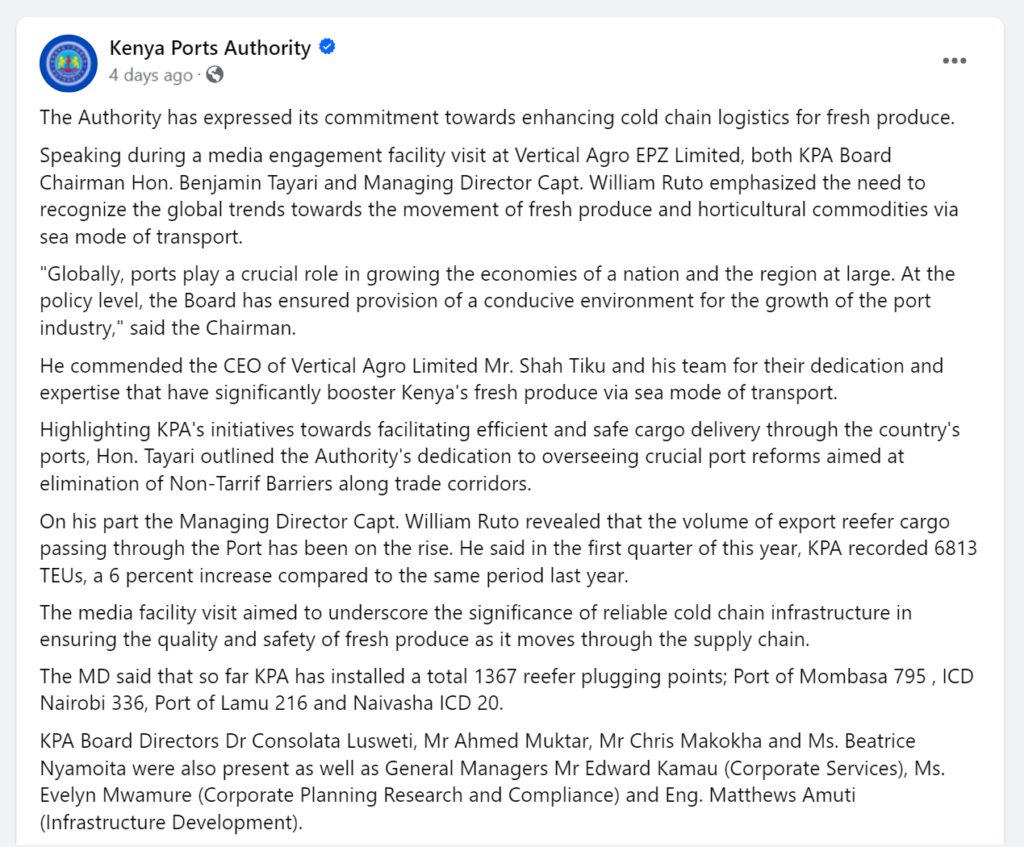The Kenya Ports Authority has introduced over 1,300 charging points for refrigerated containers, significantly improving the export process for fresh produce by sea, enhancing efficiency, and reducing costs. These points are designed to support refrigerated containers, also known as reefer containers, which are crucial for exporting temperature-sensitive fresh produce. KPA’s managing director, William Ruto, announced the installation of 795 container charging points in Mombasa, 336 in Nairobi, 216 in Lamu, and 20 in Naivasha

He noted, “We have seen an increase in fresh produce arrivals from Tanzania and other regions. This surge in demand necessitated an increase in plugging points. We prioritize shippers of containerized perishable goods to ensure they have expedited access at all entry gates.”

Addressing growing demand
KPA’s Managing Director, William Ruto, stated that the increase in charging points is in response to the rising demand from exporters, particularly those dealing with fresh produce from Tanzania and other regions. The new infrastructure provides priority access at all entry gates, ensuring that perishable goods like avocados, vegetables, and flowers are handled efficiently.
Reefer containers are equipped with refrigeration units that must be connected to an electrical source at depots, terminals, or onboard vessels. They are crucial for shipping perishable goods such as fruits, vegetables, meat, fish (both fresh and frozen), dairy products, flowers, pharmaceuticals, juices, concentrates, and chocolate.
KPA plans to further increase the number of reefer charging points and prioritize fresh produce at scanning points across port facilities to facilitate quicker truck turnaround times.
Cost-effective and reliable transportation
The introduction of these charging points has been hailed as a game-changer by industry players. Vertical Agro (EPZ) Limited’s CEO, Hasit Shah, emphasized that sea transportation, aided by these innovations, is significantly cheaper than air transport. The availability of more reefer points has also improved the cost-effectiveness of exporting fresh produce.
Support from shipping lines
Karen Rono, Head of Integrated Sales, Cold Chain at Maersk Eastern Africa, highlighted the investment made by shipping lines in the cold chain supply. This development has attracted more traders to use the Mombasa port, which now caters extensively to the needs of exporters requiring refrigerated container services.
Economic impact and future plans
The benefits of these developments are evident in the economic performance of the horticulture sector. According to Business Daily, data from the Central Bank of Kenya reveals a 15.2% growth in earnings from fresh fruits, vegetables, nuts, and cut flowers between January and April, amounting to $363 million. KPA aims to further increase the number of reefer charging points and prioritize fresh produce at scanning points to ensure quick turnaround times for trucks.
In summary, KPA’s strategic enhancements in reefer container infrastructure are set to bolster the fresh produce export sector, offering a reliable and cost-effective solution for exporters in the region
